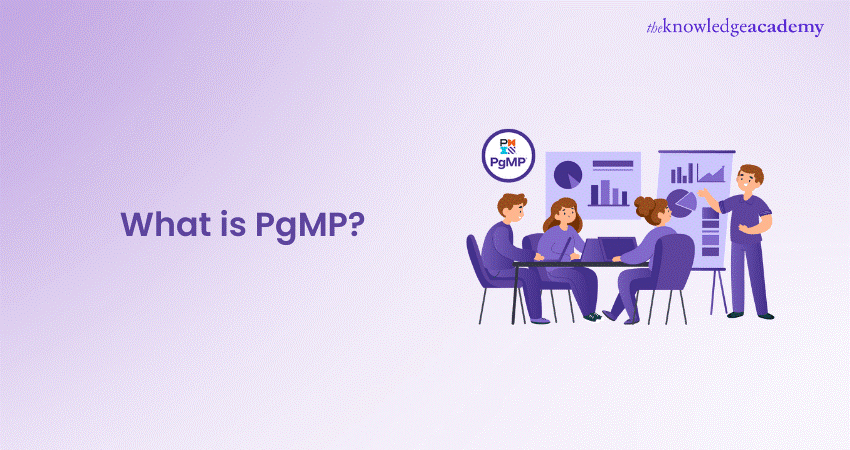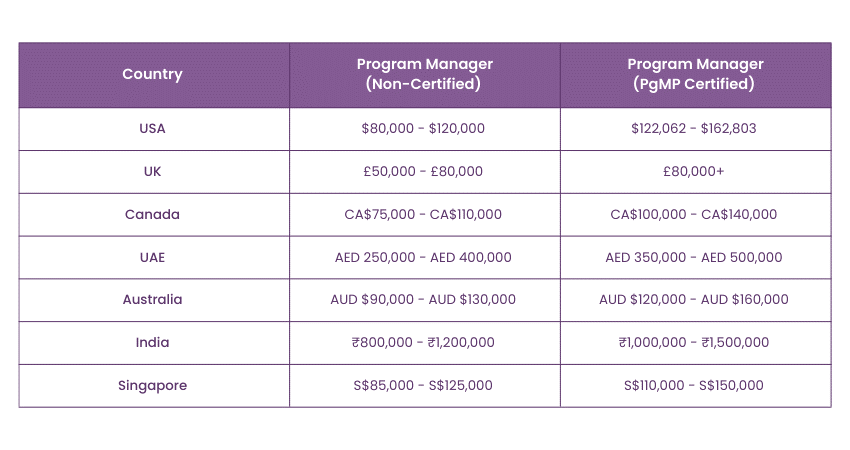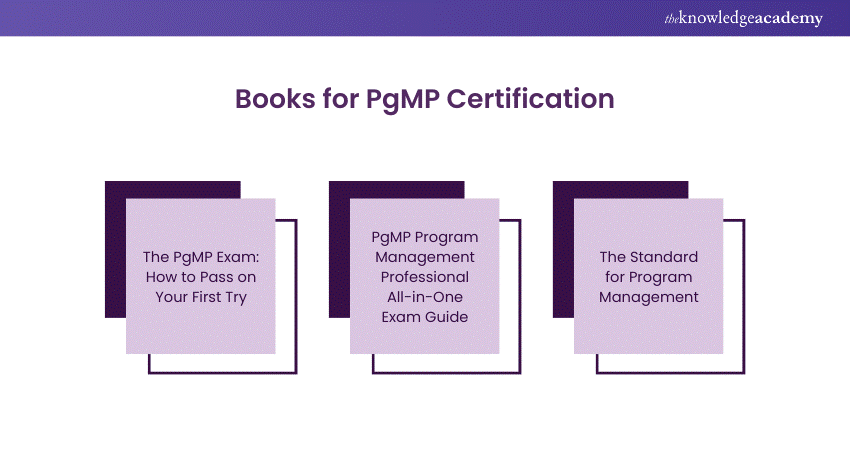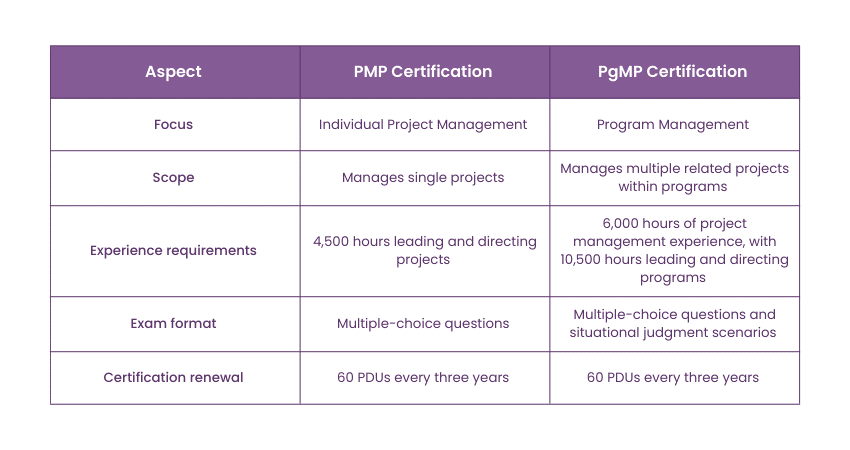We may not have the course you’re looking for. If you enquire or give us a call on +32 35001305 and speak to our training experts, we may still be able to help with your training requirements.
Training Outcomes Within Your Budget!
We ensure quality, budget-alignment, and timely delivery by our expert instructors.

Are you curious about advancing your career in Project Management, aspiring to lead complex programs and drive organisational success? It is the time to earn the Program Management Professional (PgMP) Certification. But What is PgMP, you may wonder?
It is a prestigious designation that distinguishes experts in managing multiple projects within programs. It's a comprehensive credential recognised globally for its emphasis on strategic planning, resource optimisation, and risk management.
Given its importance in the Project Management world, aspiring candidates must learn everything about this credential. So, wait no more and read this blog. In this blog, you will explore What is PgMP, from its eligibility requirements to exam preparation tips. Delve into the multifaceted responsibilities, the critical importance of this certification in today’s competitive landscape.
Table of Contents
1) What is PgMP?
2) Advantages of PgMP Certification
3) PgMP examination preparation and study tips
4) Cost of PMI PgMP
5) Salary outlook for PMI's PgMP Certification
6) Maintaining your PgMP Certification
7) Books for PMI's PgMP Certification
8) Differences Between PMP And PgMP
9) Conclusion
What is PgMP?
The Program Management Professional (PgMP) is a globally acknowledged certification. It is provided in the field of Project Management by the Project Management Institute (PMI). It is designed for senior management practitioners in large programs. As a Program Manager, you will be a leader responsible for managing multiple related projects in a coordinated way to achieve results that could not occur if the projects were handled separately.
Earning a PgMP Certification demonstrates advanced experience in Program Management used to lead and align organisational and complex programs against business strategy. The certification is awarded through a panel review by written application and then a multiple-choice exam.
PgMP holders command salaries that are considerably more than non-PgMP program professionals. If you have already demonstrated experience showing that you can handle complex activities that run across functions, organisations, regions, or cultures, then consider securing certification with a PgMP to further advance your career and take your professional profile a notch higher.
Advantages of PgMP Certification
Obtaining this certification comes with several advantages, encompassing various aspects of project and Program Management. Let's delve into each of these advantages in detail:
Resource sharing
This is one of the core advantages that an individual can get efficiently while being PgMP certified. As such, a Program Manager who is a PgMP possesses the required knowledge and skills for managing effective resource allocation to avoid bottlenecks and maximise resource usage.
PgMPs can rationalise the way resource management, coordination, and collaboration among the project teams is done when all projects are collected under one program. This results in improved productivity, reduced wastage, and enhanced overall project performance.
Swift dispute resolution
This certification prepares professionals to manage conflicts and disputes in the program environment with promptness and effectiveness. The PgMP credential helps Program Managers to identify the root causes of disharmony between project teams or stakeholders and develop ways to resolve such issues proactively.
This implies setting up a hierarchical governance structure and decision-making frameworks which facilitate conflict resolution in a fair and timely manner. The PgMP ensures projects remain on course towards the objectives without undue derailment or setbacks by minimising the disruptors and creating a working environment that is congenial.
Strategic decision making
The PgMP Certification equips professionals with the necessary skills and competencies to make strategic decisions aligned with organisational goals and objectives. Individuals who achieve this credential have a profound understanding of business strategy and market dynamics.
This allows them to evaluate risks, assess opportunities, and make sound decisions that contribute to the program's success. They utilise tools such as the following to evaluate the impact of their decisions and select the most rational course of action:
a) Scenario analysis
b) Cost-benefit analysis
c) Stakeholder engagement
PgMPs act as strategic decision-makers, contributing to the long-term success and sustainability of the organisation by adding value and minimising risks.
Effective communication
PgMP-certified Program Managers are exceptionally skilled at communicating complex ideas, priorities, and expectations to a broad range of stakeholders, including executives, team members, and external partners. They employ various methods and communication channels to ensure clear, effective, and transparent collaboration throughout the program's lifecycle.
Through presentations, meetings, or project updates, PgMPs communicate with confidence and credibility, building trust and cooperation among stakeholders. Their adept communication skills facilitate better decision-making, risk mitigation, and project success.
Resource optimisation
The efficiency and wastage decreased by optimising the resources under a program among many projects. These managers have skills in defining the resource requirements and allocating them strategically or, at times, reallocating them to the shifting priorities and constraints. Those are tools and techniques with resource leveling, including capacity planning and resource forecasting techniques. They aim at work balancing, bottleneck reduction, and guaranteeing that the project has enough resources to succeed. They thereby improve the productivity of the PgMPs with reduced program costs and, at the same time, improved performances for the entire program through optimum usage of resources.
Risk management
The PgMP Certification prepares professionals for practical identification, assessment, and effective mitigation of risks within the program environment. PgMPs comprehensively cover the risks from every point of view, including every aspect of internal and emanating from sources external to the program, which can affect the accomplishment of set-down objectives.
They develop plans that outline the methods of avoidance, transfer, mitigation, or acceptance of risks and follow up on risks in a program lifecycle so they can act on them proactively. PgMPs would help to reduce the chances of the same negative consequences and enhance the scope for success by managing the same risk areas proactively.
Quality assessment
The PgMP Certification attests that Quality Management is crucial in equipping stakeholders' expectations with delivery programs. A Program Manager with PgMP credentials can ensure that the programs are in place with a robust quality assurance process along with the metrics to monitor programs’ performance and deliverables. In quality assurance, PgMPs ensure that the customers' satisfaction is increased, the stakeholders' trust is built, and the programs are driven into continuous improvement.
PgMP exam preparation and study tips
Now that you know What is PgMP, you must also learn how to earn this certification. Mastering the Program Management concepts outlined by the PMI and passing the PgMP exam requires an organised and committed approach. In this perspective, here are study tips to enable you to emerge triumphant:
a) Examination content outline: Understand the Examination Content Outline provided by PMI for PgMP. This document highlights the key domains, tasks, and knowledge areas that the examination will cover.
b) Study plan: In this plan, you must set realistic goals and deadlines that will guide you along the right path.
c) Utilise study resources: Use study resources that may include textbooks, online courses, practice exams, and study guides to entrench your understanding of Program Management concepts.
d) Time management practice: Practice answering examination-style questions under timed conditions to create the exam environment and draw on opportunities to develop your time management skills.
e) Join a study group: Join a study group or online forum with other PgMP candidates to support each other and get a chance to work together. Explaining ideas and comparing studying methods will help them understand and remember what they are learning.
f) Regular review: Set some time for regular review sessions where you go through all the key pointers, concepts, and your own understanding. Use summaries, flashcards, and mnemonics for your memory.
g) Stay positive and persistent: Keep motivation and a positive demeanor during your studies. The persistence of realisation to success in the PgMP exam is a long chain of dedication and continuous effort.
Cost of PMI PgMP
The cost of obtaining the PMI PgMP Certification consists of several components. These components are as follows:
Firstly, there is the PMI membership fee, which is required to access member benefits, including discounted exam fees. The membership fee typically ranges from $139 to $299 USD per year, depending on membership type and location.
Additionally, there is the PgMP exam fee, which is higher for non-members compared to PMI members. As of 2024, the PgMP exam fee for PMI members is $800 USD, while non-members pay $1,000 USD.
Furthermore, there are costs associated with exam preparation materials including study guides, practice exams, and training courses, which vary depending on the provider and format. Candidates may also incur expenses related to travel and accommodation if they choose to attend in-person training or exam centers.
Note: These costs are subjected to change as per PMI’s guidelines.
Improve your managerial skills through our Certified Global Project Manager (CGPM) Course!
Salary outlook for PMI's PgMP Certification
Holding the PgMP Certification demonstrates a high level of expertise and proficiency in Program Management, which is highly valued by employers across various industries.
According to PMI's Pulse of the Profession Report, professionals with Project Management Certifications, including PgMP, typically earn higher salaries than those without certifications. PgMP-certified individuals often command higher salaries compared to Project Managers without this certification due to their specialised skills and proven ability to manage complex programs effectively.
The exact salary range for PgMP-certified professionals varies depending on factors like geographic location, industry, years of experience, and specific job responsibilities. However, PgMP-certified individuals can expect to earn competitive salaries. Here's an overview of PgMPs’ salaries across nations:

Source: Glassdoor
Maintaining your PgMP Certification
Maintaining your PgMP Certification involves fulfilling the Continuing Certification Requirements (CCR) set by the PMI. These requirements are designed to ensure that PgMP-certified professionals stay current with the evolving practices and standards in Program Management.
To maintain your PgMP Certification, you must earn 60 Professional Development Units (PDUs) every three years. PDUs can be earned through various activities such as attending relevant training courses, participating in webinars, presenting at conferences, and contributing to the profession through volunteer work or writing articles.
Additionally, PgMP-certified professionals are required to adhere to PMI's Code of Ethics and Professional Conduct, which promotes ethical behaviour and integrity in Program Management practice. By fulfilling the CCR requirements and staying engaged in professional development activities, you demonstrate your commitment to continuous learning and excellence in Program Management. Thus, you can ensure that your PgMP Certification remains valid and relevant throughout your career.
Hone your Project Management skills with our Project Management Courses – join today!
Books for PMI's PgMP Certification

Several books are available to help professionals prepare for PMI's PgMP Certification exam. One such book is "The PgMP Exam: How to Pass on Your First Try" by Andy Crowe. This comprehensive guide covers all aspects of the PgMP exam, including Program Management principles, exam preparation strategies, and practice questions.
Another valuable resource is "PgMP Program Management Professional All-in-One Exam Guide" by Joseph Phillips. This book provides a thorough overview of Program Management concepts, exam topics, and practice exercises to reinforce learning.
Additionally, "The Standard for Program Management" by PMI is an essential reference for understanding the principles and practices of Program Management as defined by PMI. These books offer valuable insights, tips, and practice materials to help aspiring PgMP-certified professionals succeed in their certification journey.
Differences between PMP And PgMP
The Project Management Professional (PMP) and PgMPCertifications are both offered by the PMI but cater to different roles within the Project Management domain. The PMP Certification focuses on individuals managing projects, while the PgMP Certification is designed for those managing multiple, related projects as part of a program. Here is a table highlighting the key differences between PMP and PgMP Certifications:

Conclusion
In conclusion, understanding What is PgMP unlocks the door to a world of strategic program management. This comprehensive guide sheds light on the PgMP certification, its benefits, eligibility criteria, and exam preparation tips, empowering professionals to advance their careers and drive organisational success through effective program management.
Improve your organisational efficiency through our Introduction To Project Management Certification Course.
Frequently Asked Questions

The PgMP Certification focuses on Program Management, which involves overseeing multiple related projects to achieve strategic objectives, whereas the PMP Certification is geared towards Project Management, focusing on managing individual projects from initiation to completion. PgMP requires more extensive experience in Program Management compared to PMP's focus on Project Management skills.

Obtaining the PgMP Certification validates expertise and increases professional credibility in Program Management. It opens doors to higher-level roles and responsibilities, fostering greater opportunities for leadership. Additionally, it facilitates salary advancement in the field.

The Knowledge Academy takes global learning to new heights, offering over 30,000 online courses across 490+ locations in 220 countries. This expansive reach ensures accessibility and convenience for learners worldwide.
Alongside our diverse Online Course Catalogue, encompassing 17 major categories, we go the extra mile by providing a plethora of free educational Online Resources like News updates, Blogs, videos, webinars, and interview questions. Tailoring learning experiences further, professionals can maximise value with customisable Course Bundles of TKA.

The Knowledge Academy’s Knowledge Pass, a prepaid voucher, adds another layer of flexibility, allowing course bookings over a 12-month period. Join us on a journey where education knows no bounds.

The Knowledge Academy offers various Project Management Courses, including Introduction to Project Management Course, Project Management Office (PMO) Fundamentals Course and Certified Digital Services Project Manager Course. These courses cater to different skill levels, providing comprehensive insights into Project Management Trends.
Our Project Management Blogs cover a range of topics, offering valuable resources, best practices, and industry insights. Whether you are a beginner or looking to advance your Project Management skills, The Knowledge Academy's diverse courses and informative blogs have you covered.
Upcoming Project Management Resources Batches & Dates
Date
 PMP® Certification Training Course
PMP® Certification Training Course
Mon 13th Jan 2025
Mon 20th Jan 2025
Mon 27th Jan 2025
Mon 3rd Feb 2025
Mon 10th Feb 2025
Mon 17th Feb 2025
Mon 24th Feb 2025
Mon 3rd Mar 2025
Mon 10th Mar 2025
Mon 17th Mar 2025
Mon 24th Mar 2025
Mon 31st Mar 2025
Mon 7th Apr 2025
Mon 14th Apr 2025
Tue 22nd Apr 2025
Mon 28th Apr 2025
Tue 6th May 2025
Mon 12th May 2025
Mon 19th May 2025
Tue 27th May 2025
Mon 2nd Jun 2025
Mon 9th Jun 2025
Mon 16th Jun 2025
Mon 23rd Jun 2025
Mon 30th Jun 2025
Mon 7th Jul 2025
Mon 14th Jul 2025
Mon 21st Jul 2025
Mon 28th Jul 2025
Mon 4th Aug 2025
Mon 11th Aug 2025
Mon 18th Aug 2025
Tue 26th Aug 2025
Mon 1st Sep 2025
Mon 8th Sep 2025
Mon 15th Sep 2025
Mon 22nd Sep 2025
Mon 29th Sep 2025
Mon 6th Oct 2025
Mon 13th Oct 2025
Mon 20th Oct 2025
Mon 27th Oct 2025
Mon 3rd Nov 2025
Mon 10th Nov 2025
Mon 17th Nov 2025
Mon 24th Nov 2025
Mon 1st Dec 2025
Mon 8th Dec 2025
Mon 15th Dec 2025







 Top Rated Course
Top Rated Course



 If you wish to make any changes to your course, please
If you wish to make any changes to your course, please


